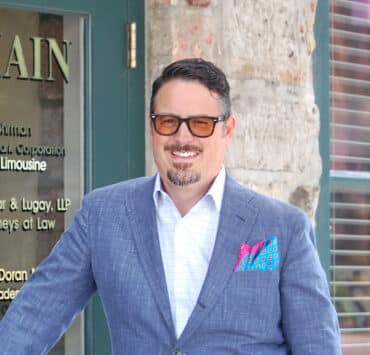|
Getting your Trinity Audio player ready...
|
No matter the store, you’re probably only a few feet away from a Celanese product. The chemical and specialty materials company is one of the world’s leading producers of differentiated chemistry solutions and specialty materials used in most major industries and consumer applications.
“It could be packaging, it could be food flavoring, or it could be paint or a part of your car. We sort of do it all,” says Mike Sullivan, vice president and deputy general counsel at Celanese. “Coming to Celanese provided me the opportunity to work for a company with a large global footprint that makes complicated products you find everywhere you look.”
Though excited to join Celanese, the timing of the move proved interesting, Sullivan says. His last interview quickly changed into a virtual meeting, as companies across the country adapted to the COVID-19 lockdown. He started his role remotely, learning Celanese’s wide array of business from afar, and in a time of great transition.
The pandemic accelerated a trend already taking place. Environmental, social, and governance (ESG) expectations of companies continue to take higher priority for investors, stakeholders, and businesses alike. However, Sullivan says many initially thought those considerations would get pushed to the backburner, while companies confronted the absolute chaos and unknowns of a worldwide shutdown.
“Coming to Celanese provided me the opportunity to work for a company with a large global footprint that makes complicated products you find everywhere you look.”
Mike Sullivan
“At Celanese, COVID really illustrated the opposite of those assumptions,” he says. “While I was tackling bank and treasury issues, capital markets issues, and the impacts of reduced stock prices, we also were all thinking very hard about what kind of company we want Celanese to be in terms of its ESG position.”
While sustainability always has been a built-in component of Celanese’s products and strategy, the VP says increasing expectations from investors and stakeholders mean that environmental and other sustainability impacts are taken just as seriously as the bottom line.
“It’s no exaggeration that ESG issues have become primary investment criteria for either equity or debt investors, it’s something we hear all the time,” Sullivan says. “In my entire career, I haven’t seen the extent to which people are diving into everything from details of proxy statements to SEC disclosures, websites, and other information. I think it’s a really positive development for corporate America overall, and it really aligns with what the company had already been working toward.”
This is where the deputy general counsel is most effective. He manages Celanese’s fall shareholder ESG outreach program, where the company seeks to connect with as many shareholders as possible to understand their expectations, their priorities, and how they align with Celanese’s broader mission. The lawyer says building those relationships is critical for both the boom times and more challenging ones.
“It feels like the SEC has issued more, and more meaningful, rulemaking in the last six months than in the prior five or six years.”
Mike Sullivan
Sullivan has his share of both at present. In February 2022, Celanese announced an agreement to buy DuPont’s engineered thermoplastics and elastomer business for $11 billion, a landmark moment for the company. The lean, in-house legal team certainly had its work cut out for itself, but came through with flying colors.
“We are preparing for the largest and most complicated acquisition that Celanese has done in recent history,” Sullivan says. “I’m really proud of what our legal department has been able to accomplish, working together, while being all over the world. As we prepare for integration, everyone on the team has a significant amount of work and a significant role to play in making it happen for the company.”
While working closely with the broader legal team to ensure legal readiness to support the acquired business from day one, there are other developments keeping Sullivan occupied. The lawyer does his best to stay abreast of a US Securities and Exchange Commission more active than ever.
“It feels like SEC has issued more, and more meaningful, rulemaking than in the prior five or six years,” Sullivan explains. “The robust proposed climate disclosure rules are some of the momentous and impactful regulations we’ve seen in a long time. And while you never know exactly what the final form will be, it’s so big that we can’t just wait to see what happens.”
With new rules around cybersecurity and corporate trading plans, Sullivan says if it’s a business interest in his purview, there are probably new proposed rules through which he needs to help the company work. His job isn’t just to check the pulse of SEC propositions, but to help navigate a global organization toward proactive adaptability. It’s trying to hit the bullseye on a moving target, but his deep securities experience comes in handy.
Sullivan went looking for a challenge and found it. The firm lawyer turned vital, in-house practitioner has managed to thrive in the most challenging business environment of the last century. “The next couple of years are going to be pretty interesting,” he says. “It’s an incredible time of change, and this is the kind of work I love to do.”
Baker McKenzie:
“Over the years we have worked with Mike on many international projects. Mike is not only a very knowledgeable in-house lawyer with great managing skills, but also a very pleasant person to work with.”
–Benjamin van Kessel, Partner, and Jean-François Findling, Partner


